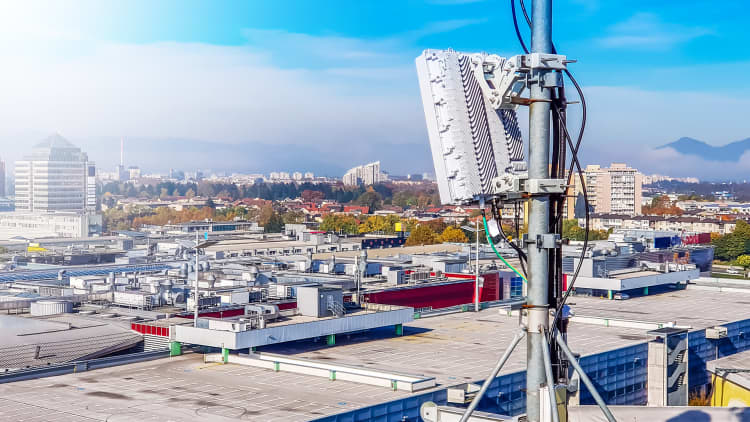The U.S.-China trade war has upset supply chains and affected the global growth outlook, but Taiwan's economy has been unusually resilient — a factor that may help incumbent President Tsai Ing-wen's bid for a second term in January polls.
Last week, Taiwan posted 2.91% on-year GDP growth in the third quarter of 2019, bucking the sluggish trend displayed by trade reliant Singapore, South Korea and Hong Kong. Taiwan's growth in the July to September quarter beat the forecast of 2.5% in a Reuters poll of analysts and was higher than the 2.4% growth recorded in the second quarter of 2019.
Taiwan's strong GDP upturn in the third quarter was boosted by exports, mainly in the electronics sector, which the territory is known for.
The latest data read could benefit incumbent Tsai who is seeking a second term on the back of rising approval ratings. Support for Tsai got a boost after protests broke out in neighboring Hong Kong, spurring concerns about Beijing interference and influence in the Chinese special administrative region.
Beijing considers self-ruled Taiwan to be a wayward province and and has been using increasingly aggressive rhetoric toward the island to push for a reunification after a civil war split the two territories 70 years ago. Relations between Beijing and Taipei have been chilly since Tsai took office in 2016 as she has not acknowledged Beijing's "One China" principle, which stipulates that Taiwan is part of China.
"Good economic news always benefits the incumbent. (It is an) advantage (for) President Tsai Ing-wen and her Democratic Progressive Party (DPP)," said Sean King, a former U.S. trade official who is now senior vice-president of political strategy firm Park Strategies.
Tsai played up the territory's third-quarter growth, comparing it against lackluster GDP figures from peers Singapore, South Korea and Hong Kong. The four are often stacked against one another as they are highly developed economies in Asia that have achieved rapid industrialization since the 1960s.
Singapore's economy grew 0.1% while South Korea's economy expanded 2.0% in the same period, as the U.S.-China trade dispute dampened activity. Hong Kong's economy contracted 2.9% from a year ago amid domestic political unrest.
But Taiwan's third-quarter GDP boost appears to be cyclical, analysts said.
"An important factor boosting Taiwan's exports in Q3 2019 has been the launch of new smartphone models ahead of Christmas, including the Apple iPhone 11, which has helped drive new orders across Taiwan's electronics manufacturing supply chain," said Rajiv Biswas, Asia pacific chief economist at IHS Markit.
Taiwanese firm Foxconn, also known as Hon Hai Precision Industry, is a major supplier for tech giant Apple.
Iris Pang, Greater China economist at ING Bank said in a note last week that she expected Taiwan GDP growth to slow going forward amid U.S.-China trade tensions and general sluggish demand for new smartphones.
Tsai will play up move to steer from China dependence
Still, there are other factors propping up the Taiwanese economy.
Despite a fall in tourist numbers from China, due to icy relations between Beijing and Taipei, Taiwan received a record 11 million tourists in 2018. Beijing stopped issuing individual travel permits from August this year, a move that will hit the tourism industry. However, a Taiwanese government official told Reuters that foreign tourist arrivals boosted third quarter growth nonetheless.
In a bid to avoid being over-reliant on China, the Tsai administration had already embarked on policies to engage and attract investments and visitors from other markets such as Southeast Asia.
The U.S.-China trade war also helps.
Taiwanese firms, many of which have over the years set up factories in China, have also begun to reshore. These companies are bringing some production back to the territory to avoid steep U.S. tariffs on exports made in mainland China.
Tsai's administration is also giving incentives such as subsidies to attract Taiwanese firms operating overseas back home, prompting some manufacturers to move production lines home from China, said ING's Pang.
Foreign direct investment approvals into Taiwan rose 9.4% in the first nine months of 2019 to $8 billion, with the electronics sector accounting for around one-third of this investment, added IHS' Biswas.
Tsai's key opponent Han Kuo-yu from the opposition Nationalist Party or Kuomintang had highlighted the economic benefits of closer ties with mainland China. But that line may now be less convincing to Taiwanese spooked by the civil unrest in Hong Kong. Han, who is mayor of Kaohsiung city, has also toned down that stance as protests escalated in Hong Kong.
"I expect safeguarding Taiwan's de facto independence will be of primary concern to many voters," said King, who is also a scholar at University of Notre Dame's Liu Institute for Asia and Asian Studies.
So in the lead-up to the voting box, "Tsai will argue that her attempts to lessen Taiwan's economic dependence on the mainland have helped insulate the island from China's slowdown and China's trade conflict with America," added King.
Taiwan's electronics export industry may not do so badly in the next few years either, said IHS' Biswas, as the economy could gain in the longer term from the ongoing global rollout of 5G telecommunications infrastructure.
"This is expected to drive a long upswing in the rollout and sales of 5G smartphones worldwide, helping to underpin Taiwan's electronics export industry over the medium-term outlook," Biswas said.


